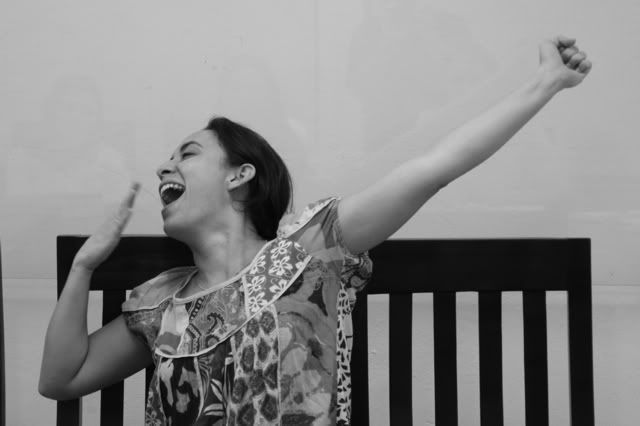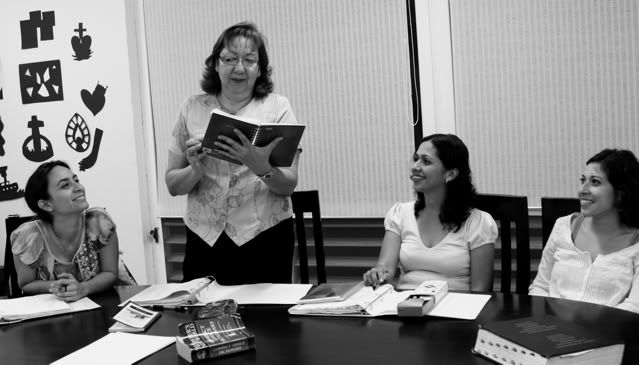
- Fabiola Waking Up
This semester in my language classes I've been experimenting with ways of teaching in a way that embraces magic realism. Magic realism is the literary style that is often used to describe the work of Gabriel García Márquez and other Latin American writers where the boundary between the "real" and the "imaginative" becomes obscured. I'm not actually teaching magical realism in my language classrooms, but rather experimenting with a pedagogy that allows for magic to happen on a daily basis, where the students' seats rise a little off the floor and strange creatures peek into the windows. I'm hoping to move my classes beyond how languages are typically taught in a utilitarian way. If you examine most language textbooks you'll find they are organized into units that focus on our daily tasks: shopping for clothes, going to the grocery store, visiting the doctor's office. In my class we don't use a textbook. Our goal is to release the inherent magical quality of words. We play, improvise, and create with them. We read literature and poetry to experience the aesthetic quality of the language.
In one of my classes, we're reading John Steinbeck's novel The Pearl which begins, "Kino awakened in the near dark." One of the reasons I enjoy teaching literature in a classroom where the student's are learning a language, is that it slows us down. Since the students aren't fluent readers, we often take the time to work through a paragraph, sentence by sentence. As readers, this gives us the chance to really spend time with the words. For example, when I read this first line at home, I didn't think much of it. I raced on through the plot eager to see what would happen after Kino woke up. But in the language classroom we had to start the novel by talking about the word "awake." Why does Steinbeck use "awakened" rather than "woke up"? Before my student's asked this question I hadn't thought about the difference much before. As we started to explore the word "awake," we realized it is a verb that is much more profound than its counterpart "wake up." We don't really wake up spiritually, but we might have a spiritual awakening. We can become awake in myriad ways: politically, socially, sexually, and morally to name a few. So perhaps there is more to this first sentence than what lies on the surface. Does the fact that Kino is awakening in the dark mean that he hasn't awakened to some realization, that he might experience this change later? Or does the qualifier "near" mean that he is beginning to see light of some kind, that this novel will be about his process of awakening to something larger in the world?
My work as both a teacher and a reader has been highly influenced by Robert Cole's book The Call of Stories. One of the reasons our school places literature in the center of the language classroom, is because in Cole's words,
Novels and stories are renderings of life, they can not only keep us company, but admonish us, point us in new directions, or give us the courage to stay a given course.
Our classrooms move back and forth between the work of literature and the students' lives. We use literature to inspire us to reflect on who we are, where we are on our own personal journeys in life, and we find the words to tell our own stories. My class continued to read the first chapter as Kino wakes up . We looked at the verbs Steinbeck used to describe waking up rituals, verbs like braid and comb. I then asked for a volunteer to show his/her waking up ritual in front of the class. Fabiola mimed her waking up ritual and the rest of the class called out the verbs they were witnessing, and we put the phrases on the board (hit snooze, turn off the alarm, get out of bed, take a shower, put on makeup, grind the beans, prepare coffee, make breakfast). In pairs, all the students, using the words on the board for help, told each other their daily rituals of waking up.
So far, aside from our discussion about the opening line of the book, this might look like any other language classroom: listing the words of our daily routines. A discussion of our daily rituals of waking up, from purely a language learning perspective, is important, but I want my student to move beyond the day-to-day use of language, to find ways to play with language in a creative way, one that helps us see new worlds beyond the words on the page. One of my favorite quotes from Argentinian educator Emilia Ferreiro is
There are children who enter written language through magic (a cognitively challenging magic) and other children who enter written language through training in "basic abilities." In general, the first become readers; the others have an uncertain fate.
As my students learn English, I want them to see their own potential in using the language in ways that are unexpected, helping them to open up to become more flexible and playful in how they form phrases and sentences in English. I asked the students to write two sentences finishing the phrase, "After I wake up I . . . " One sentence needed to be true, something they do every morning. But the other sentence needed to be surrealistic, something that could only happen in their imaginations.
Fabiola wrote:
1. After I wake up I make coffee.
2. After I wake up I float up to the ceiling and turn the house upside down.
We shared our responses around the table and then I asked the students to write a story about waking up. They had two options:
- Write a fantastic or surrealistic story about waking up in the morning.
- Write a true story about a time you woke up and something unusual happened, outside of your daily routine.
When the students finished their stories, we had trouble telling the difference between the imagined and the real. As I read my students stories, I felt like I was in Márquez's town of Macondo in his novel One Hundred Years of Solitude. Although the novel closely relates to Marquez's life, there is a continuous procession of remarkable events that move us to see reality in a fantastic way.

- Hortencia reads her story
One of my students, Hortencia, wrote the following story:
I awakened in the middle of the night feeling a strange presence in my room. It was so real that I felt it very close to me but at the same time it occupied all of the room. The atmosphere was cold, rare, silent, and with a sense of somebody here and there.
I was so scared that I couldn´t even scream or get out of my bed; I was paralyzed. I tried to pray or to remember a Bible verse and repeat it as I very slowly got out of the bed and walked terrified to the light switch and turned it on.
My room was as it was always, nobody there. I was still feeling that strange presence when I heard my mom screaming “fire!” so I went out of my room and ran to the front door and I saw red lights, and I opened the window and some neighbors were on the sidewalk next to my house.
My mother opened the door and the neighbors told her that the old lady who lived in front of us had died. That was the reason the ambulance was there and I asked them at what time she died and they said “at 2:15 a.m”; that was the time I had awakened.
HORTENCIA PEÑA GARCIA
FEBRUARY 1, 2011
Living in Mexico, I've realized how important telling stories is in people's lives. Sitting in my classroom, listening to the stories my students' tell, one might think, "That's impossible. How could that be real?," but it's so much more pleasurable to listen to the stories and for a time put what we think of as true and real, aside for the moment, and for a moment ride the wave of the sentences as they unfold.